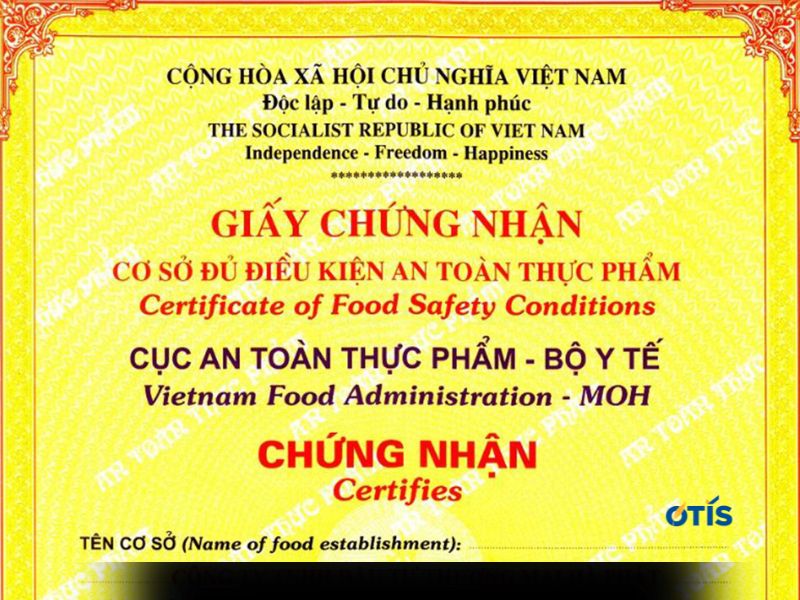Food safety is a very hot issue in today’s society. The situation of restaurants not ensuring hygiene processing or enterprises producing dirty food for profit is no longer strange to each of us. Of course, facing this bad situation, the State cannot just ignore. To intervene in this matter, the State promulgates regulations on the Certificate of Food Hygiene and Safety. So how is this regulation, let’s find out with OTIS LAWYERS in this article.
LEGAL BASIS
- Law on Food Safety 2010;
- Decree 15/2018/ND-CP;
- Decree 115/20218/ND – CP.
CONCEPT OF FOOD SAFETY CERTIFICATE
Certificate of food safety and hygiene, the full name is Certificate of qualified establishments for food safety, is a license issued by a competent authority to an enterprise or business household. food business, food production, and catering services to ensure that establishments meet food hygiene and safety conditions as prescribed by law.

CONDITIONS FOR ISSUANCE OF FOOD SAFETY AND HYGIENE CERTIFICATE
Food service establishments, food processing establishments
- The kitchen is arranged to ensure that there is no cross-contamination between unprocessed food and processed food.
- Having enough water meeting technical standards for processing and trading.
- Having tools to collect and store garbage and waste to ensure hygiene.
- Drains in store and kitchen areas must be clear and not stagnant.
- The cafeteria must be airy, cool, well-lit, maintain a clean hygiene regime, and take measures to prevent harmful insects and animals.
- There are equipment for food preservation, toilets, hand washing and daily cleaning of waste and garbage.
- The head of the unit with collective kitchen is responsible for ensuring food safety.
- Having registered food business lines in the Enterprise Registration Certificate.
Food production and trading establishments
- Having an appropriate location and area, having a safe distance from toxic sources, pollution sources and other harmful factors;
- Having enough water meeting technical regulations for food production and trading;
- Having adequate equipment suitable for raw material handling, processing, packaging, storage and transportation of various foods; having sufficient equipment, tools, means of washing and disinfecting, antiseptic water, equipment for prevention and control of insects and harmful animals;
- Having a waste treatment system operating regularly in accordance with the law on environmental protection;
- Maintaining conditions to ensure food safety and keep records on the origin of food materials and other documents on the entire process of food production and trading;
- Comply with regulations on health, knowledge and practice of people directly producing and trading food.
- Having registered food business lines in the Enterprise Registration Certificate.
APPLICATION FOR FOOD SAFETY AND HYGIENE CERTIFICATE
An application for a certificate of food hygiene and safety includes the following documents:

- An application form for a Certificate of eligibility for food safety;
- Copy of Enterprise Registration Certificate;
- An explanation of the facilities, equipment and tools to ensure food hygiene and safety conditions as prescribed by the competent state management agency;
- Health certificate of the establishment owner and the person directly producing and trading food, issued by a district-level or higher-level health facility
- Certificate of training in food safety knowledge of the establishment owner and of the person directly producing and trading food according to regulations of the Minister of specialized management.
ORDER AND PROCEDURES FOR FOOD SAFETY AND HYGIENE CERTIFICATE
Step 1: Submit the application at the competent authority
Filed at the Ministry of Industry and Trade
– Establishments producing food products with designed capacity:
+ Alcohol: From 03 million liters of product/year or more;
+ Beer: From 50 million liters of product/year or more;
+ Beverage: From 20 million liters of product/year or more;
+ Processed milk: From 20 million liters of product/year or more;
+ Vegetable oil: From 50,000 tons of products/year or more;
+ Confectionery: From 20 thousand tons of products/year or more;
+ Flour and starch: From 100,000 tons of products/year or more.
– Chain of food business establishments (except chains of mini supermarkets and chains of convenience stores with an area equivalent to mini supermarkets as prescribed by law); food wholesalers (including synthetic foods) in two or more provinces or centrally-affiliated cities.
Filed at the Department of Industry and Trade or the One-Stop-Shop as prescribed by the Provincial People’s Committee
– Establishments producing food products with lower design capacity
– Food business establishments of wholesalers or wholesalers in 01 province or centrally-affiliated city or food retail establishments in that province or city.
Step 2: Receive and process the application
When submitting the application, the receiving department will record it in the book and give the application receipt (in which the date of appointment to return the result of the application is clearly stated).
From the date of receipt of complete and valid dossiers, competent state agencies shall conduct physical inspection of food safety assurance conditions at food production and trading establishments.
Step 3: Return the result
Within 15 days from the date of submission of a complete dossier, if all conditions are met, the state agency must issue a Certificate of food safety eligibility; In case of refusal, it must reply in writing and clearly state the reason.
Note: The validity period of the Certificate of Food Hygiene and Safety is 03 years.
Before the certificate expires, establishments need to carry out the procedures for re-issuance if they continue to carry out production and business activities.
HOW TO HANDLE VIOLATIONS OF NO FOOD SAFETY AND HYGIENE CERTIFICATE?
Pursuant to Article 18 of Decree 115/2018/ND-CP on Violations against regulations on Certificates of food safety eligibility, there will be penalties for acts without certificates as follows:
| No. | Violations | Amount of fines | Remedial measures |
| 1 | Food service business without a Certificate of eligibility for food safety | From 20 to 30 million VND | |
| 2 | Producing and trading in food without a Certificate of eligibility for food safety, except for the third case. | From 30-40 million VND | Forcible recall of food for violations specified in Clauses;
Forcible change of use purpose or recycling or destruction of food. |
| 3 | Producing health foods without a Certificate of eligibility for food safety meeting the requirements of good manufacturing practice (GMP) of health foods according to the roadmap | From 40 to 60 million VND |
If the establishment has come into operation without a certificate of food hygiene and safety, it will be fined according to the provisions of law. Penalties range from warning to administrative fine according to different levels and cases mentioned above. It is even possible to close the facility and incur some additional penalties such as: confiscation of invalid documents.
OTIS LAWYERS: Food Hygiene and Safety Certificate application service
OTIS LAWYERS is always proud to be a professional unit in consulting and supporting the implementation of procedures related to sub-licenses in general and food safety licenses in particular. A team of highly qualified lawyers with extensive experience and dedication to clients, we believe that we will provide you with the best, most professional service, reasonable cost and time. Complete the process as quickly as possible. We commit that all client information is absolutely confidential and client interests always come first.

For any questions or comments, please contact:
OTIS AND PARTNERS LAW FIRM
Office address: K28 – Group K, Lane 68 Trung Kinh, Yen Hoa Ward, Cau Giay District, Hanoi
Email: info@otislawyers.vn


 Tiếng Việt
Tiếng Việt 한국어
한국어 中文 (中国)
中文 (中国)